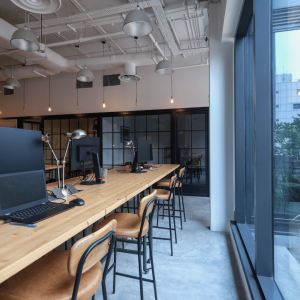How to Choose the Right Co-Working Space for Your Business Needs
How to Choose the Right Co-Working Space for Your Business Needs
1. Clearly Define Your Business Requirements
Start by understanding your business’s unique needs. • Are you a solo entrepreneur, part of a tiny creative team, or leading a fastscaling startup? • Do you need hot desks, dedicated desks, or private cabins? • How frequently will you need meeting or conference rooms? • What level of privacy, security, or noise tolerance does your work demand? Identifying these requirements will help you filter out spaces that look appealing but aren’t a practical fit, saving you valuable time and ensuring the space supports growth and productivity.
2. Prioritize the Best Location
Location isn’t just about geography—it’s about accessibility, convenience, and impression: • Proximity to clients and partners: Choose a location that’s easy for your clients, employees, or collaborators to access. A business address in a reputed area lends credibility. • Access to public transport: Look for co-working hubs near metro, bus, or rail stations. Reduce commute hassles for everyone involved
Every co-working space offers a different bouquet of amenities. Identify what’s truly essential for your operations:
• High-speed, reliable internet connectivity.
• Conference/meeting rooms with AV equipment.
• Printing, scanning, and mail-handling services.
• Cafes, breakout zones, lounges, and recreational areas.
• Secure entry, locker facilities, and on-premise IT support.
4. Consider Community and Collaboration Opportunities
Co-working isn’t just about desks; it’s about people.
• Community vibe: Does the space foster a productive, friendly, and professional
culture?
• Networking potential: Are there events, workshops, and formal/informal
networking opportunities to meet possible partners, mentors, or clients
• Industry fit: Some co-working spaces specialize in sectors (tech, creative, professional services) or host like-minded businesses that can stimulate growth through collaboration.
A strong community culture can foster partnerships, collaborations, client referrals, and even new friendships.
5. Flexibility and Scalability Business needs are dynamic.
• Look for co-working spaces that offer flexible access, adjustable terms, and the ability to scale up (or downsize) your space as your team grows or contracts.
• Check if you can access multiple locations, 24/7 access (if needed), and whether you can transition between different workspace plans easily. This agility is essential for startups and growing companies that need to react to market demands quickly.
• Compare pricing transparently. Are utilities, mail handling, and cleaning included? • Ask about refundable deposits, minimum commitment periods, and any other hidden or extra fees like guest hours, locker charges, or additional printing. • Make sure the contract terms (cancellation, upgrades, or changes) align with your business projections and risk tolerance.
• Check for cleanliness, natural lighting, workspace layout, and overall vibe. • Test internet speeds, mobile network reception, and technology. • Observe sound levels, social atmosphere, and how staff responds to queries. • If possible, trial the workspace for a day or week before committing. First-hand experience helps you avoid surprises and sets realistic expectations.
8. Think About Security and Safety
• Ensure the building has secure entry (keycards, biometric scanners).
• Are your belongings safe? Is there adequate CCTV coverage?
• Particularly for businesses handling confidential data, ensure the workspace
design and access controls meet your privacy requirements.
• Does the space offer ample, affordable, or complimentary parking?
• If your team cycles or uses cabs, are those needs supported?
• Proximity to major roads, airports, and business hotspots is a bonus, especially if
travel is frequent.
10. Sustainability & Ambience
Modern businesses and talent appreciate workspaces that are environmentally
conscious (recycling, green materials), have plants, and plenty of natural light.
A healthy, light-filled, thoughtfully designed environment improves productivity
and morale.
11. Customer Support and Management
Quick resolution of issues, transparent communication, and approachable
community managers make a big difference to your day-to-day experience.
Test their responsiveness before you sign the contract.
12. Look for Added Business Support Services
Some premium co-working spaces go beyond just offering desks and rooms.
They provide value-added services that support your business growth, such as:
• Virtual Office Services (Business Address, Mail Handling)
• Reception & Call Handling Services
• Business Mentorship & Incubation Programs
• Legal, Financial, and Marketing Assistanc Such services can be extremely beneficial, especially for startup and small businesses that require a cost-effective business infrastructure.




